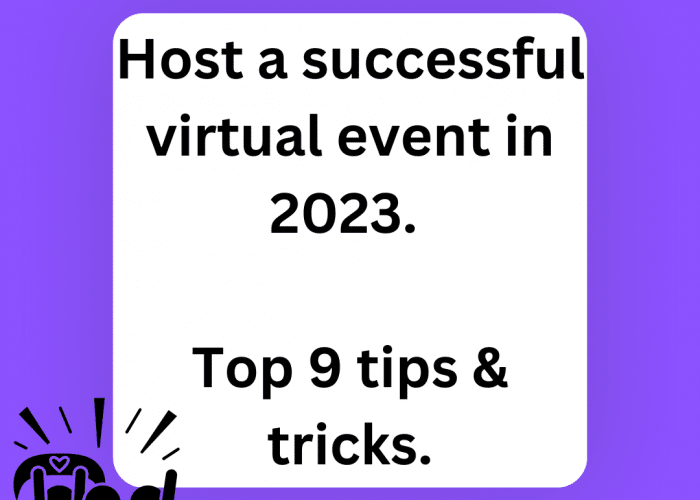Say goodbye to Zoom fatigue and hello to virtual events that leave a lasting impression! Virtual events have become the norm and hosting a successful one is the key to staying ahead of the game.
Don’t worry, we’ve got you covered.
We’ve scoured the virtual world and rounded up the top 9 tips and tricks to make your online event a memorable experience for all.
So sit back, grab a drink, and let’s get ready to take your virtual game to the next level!

What are virtual events
Online activities referred to as “virtual events” take place virtually rather than physically. They are frequently held online and open to attendees from anywhere in the world utilizing video conferencing or webcasting software.
Numerous activities fall under the category of virtual events, including webinars, online conferences, trade exhibitions, networking opportunities, and live performances streamed over the internet.
Types of virtual events
Virtual events come in a variety of forms, including:
- Webinars: Online presentations with a big audience that are educational or enlightening.
- Virtual Conferences: Significant gatherings that draw participants, speakers, and exhibitors from around the globe to participate in interactive sessions and network.
- Virtual Trade Shows: Online exhibitions that give businesses the chance to present their goods and services to a large audience.
- Networking: The term “virtual networking events” refers to online get-togethers where participants can interact, network, and share information.
- Live Event Streaming Performances: A live online feed of a musical, theatrical, or comedy performance that viewers can watch at home.
- Virtual Career Fairs: Online career fairs that give job searchers the chance to network with employers and learn about available positions.
- Virtual Product Launches: Online event launch for new products that let businesses show off their wares to a larger audience.
- Virtual Tours: Offered as a way for visitors to experience and learn about these places from anywhere in the world, guided online tours of museums, historical sites, or other locales.
Tips & tricks to host a successful virtual events
To ensure the success of your virtual event, it’s important to invest in high-quality equipment, plan engaging and interactive sessions, and effectively communicate with your audience before, during, and after the event.
By following these best practices, you can host a seamless and successful virtual event that meets the needs and expectations of your attendees. Read on:
1- Relevancy:
While planning the stage 1 of your virtual event, conduct relevant research to understand the audience to ensure only the relevancy. Ask and analyse for questions like:
- What will the audience be interested in? Identify an appealing topic for the event.
- Ask when your audience will be most available? Choose the right date & time for maximum participation.
- Seek to understand what your audience is looking for while attending the event. Freebies, education, networking, learning or more.
2- Event goals
Any virtual event must have clearly defined event goals in order to be successful since they serve as a guide for the planning process and help to ensure that the event is in line with the organization’s overarching goals.
Event goals also aid in gauging the event’s effectiveness and determining whether the event’s desired outcomes have been realized.
Examples of event objectives are:
- Education and awareness-raising: To inform participants about a certain subject or increase awareness of a certain issue.
- Lead generation: The process of generating leads for sales or business development.
- Networking: To provide guests the chance to meet people in their business and network.
- Brand Awareness: To raise brand awareness and position the company as a thought leader in its industry.
By defining specific event goals, you can focus your efforts on creating an event that is aligned with your organization’s objectives and provides a positive experience for attendees.
3- Event branding
Virtual event branding is essential to their success since it helps to establish a distinctive and consistent image for both the company and the event.
A powerful brand identity can help the event stand out from the competition, build credibility, and draw in a bigger, more enthusiastic audience.
The success of a virtual event can be influenced by virtual event branding in the ways listed below:
- Increased Recognition
- Improved Credibility
- Increased Attendance
- Increased Engagement
- Increased Revenue
4. Put together a team
Without a great team, no event can be successful. Especially in case of virtual events, putting together a reliable team from branding to analysis is very crucial.
- Land great speakers (Yes, very much part of the team)
- Have a social media team in place
- Ensure full-time tech team availability for managing event technology
- Product team for event analysis
- Content team to ensure the right content delivery
- Creative team to ensure audience engagement
5. Choose a virtual event platform
The success of virtual events depends on selecting the best virtual event platform because it has a significant impact on the entire experience of attendees, the usability of the platform for event organizers, and the functionality of the event as a whole.
The following essential characteristics should be taken into account when selecting a virtual event platform:
- User-friendly Interface
- Video Conferencing and Streaming Capabilities
- Interactive Features
- Customization Options
- Data and Analytics
- Integration with Other Tools
- Technical Support
With the right technology, virtual event planning will become simpler!
If you want to find the right Virtual Event Platform, here is a guide for you:
6. Create excitement & send reminders
Before a virtual event, it’s critical to generate anticipation and send out reminders to encourage participation. Before a virtual event, some strategies for building anticipation include:
- Social Media: Promote the event using social media by using sites like Facebook, Twitter, Instagram, and others to share updates and engage with attendees.
- Email campaigns: Send registered attendees email invitations, reminders, and follow-up messages.
- Video trailers: Produce a brief video highlighting the main features of the occasion and what attendees can anticipate.
- Pre-event activities: To engage participants, include pre-event activities including virtual networking events, virtual tours, and interactive workshops.
- Influencer marketing: Work together to promote the event and create enthusiasm among influencers in your sector.
- Giveaways and competitions: Run competitions and giveaways to encourage participation.
- Interact: Include interactive components to keep participants interested, such as polls, Q&A sessions, and games.
7. Test tech
Testing tech support before a virtual event is extremely crucial. This helps to ensure a smooth and seamless experience for the attendees, and can prevent technical issues that could disrupt the event. Here are some reasons why testing tech support is so important:
- Ensure compatibility
- Identify and fix technical issues
- Improve the user experience
- Build confidence in the technology
- Avoid embarrassment
So, before you start, test the tech, again & again!
8- Engage
Keeping viewers attentive, interested, and participating in the event is made possible by engaging the audience throughout virtual events.
Attendees are more likely to retain important details, create significant connections, and have a great overall experience when they are engaged. During virtual events, you can engage the audience in the following ways:
- Include interactive components: To keep participants interested, include components such as polls, Q&A sessions, and games.
- Audience participation: Encourage audience engagement by asking questions, offering feedback, and sharing your ideas and opinions with the group.
- Networking opportunity: Allow attendees a chances for networking, such as break-out rooms and virtual networking sessions, so that attendees may engage with one another.
- User-generated material: To foster a sense of community, encourage attendees to share their own content, such as images or films.
- Use interactive tools: Use slides, videos, and images to make your presentations more interesting.
- Organize a panel discussion: have a panel discussion where participants can pose questions to the panelists and converse with them.
- Encourage participants to submit feedback: Provide opportunities for attendees to provide feedback on the event, such as through surveys or Q&A sessions.
9- Post event analytics
Having a post-virtual event analysis is important for several reasons:
- Evaluate success
- Identify areas for improvement
- Measure impact
- Demonstrate value
You can employ a number of techniques to follow the post-virtual event analysis, including:
- To get feedback and opinions from guests on the event, send out surveys to them.
- During the event, track attendance, engagement, and other metrics using analytics tools.
- Social media metrics, keep track of the event’s social media activities to see how much interest and engagement there is.
- Sales information, monitor sales information to ascertain the effect of the incident on your company.
- Hold focus groups with guests to get their in-depth opinions on the event.
Conclusion
In conclusion, hosting virtual events can be a wild ride, but with the right virtual event tool, you’ll be soaring above the clouds in no time!
The tips and tricks outlined in this blog will help you navigate the virtual event landscape with ease, ensuring your event is a star-studded performance that’s talked about for eons to come.
So buckle up, grab your virtual event tool, and get ready to host a virtual event that’ll make everyone say “wowza!”
And if all else fails, just remember: even if your virtual event has a few hiccups, it’s still better than standing in line for hours to use the bathroom at an in-person event. Happy hosting!
If you want to deep dive in the world of virtual event management software, here is a blog curated by team SpotSaaS on the same topic:
Virtual Event Platform For Proven Coordination: Detailed Guide
How to engage audience audience during virtual events?
Hosts can engage audience during virtual event through ways like:
1- Include interactive components: To keep participants interested, include components such as polls, Q&A sessions, and games.
2- Audience participation: Encourage audience engagement by asking questions, offering feedback, and sharing your ideas and opinions with the group.
3- Networking opportunity: Allow attendees a chances for networking, such as break-out rooms and virtual networking sessions, so that attendees may engage with one another.
4- User-generated material: To foster a sense of community, encourage attendees to share their own content, such as images or films.
5- Use interactive tools: Use slides, videos, and images to make your presentations more interesting.
6- Organize a panel discussion: have a panel discussion where participants can pose questions to the panelists and converse with them.
7- Encourage participants to submit feedback: Provide opportunities for attendees to provide feedback on the event, such as through surveys or Q&A sessions.
What are the best virtual event management tools?
Some leading virtual event platforms are:
Zoom
Brella
Zuddl
Run The World
Lets Get Digital
Virbela
What are virtual events?
Online activities referred to as “virtual events” take place virtually rather than physically. They are frequently held online and open to attendees from anywhere in the world utilizing video conferencing or webcasting software.
Read More
Top 5 difference between a payment gateway and a payment processor. Resourceful Read!




